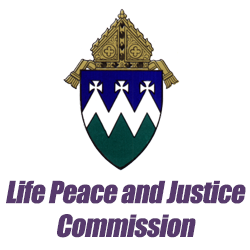Life Peace and Justice Commission: Catholic Social Teaching For Today
WAR
Catholic Social Teaching began when the Church began. The earliest social instruction for the Church is found in the Acts of the Apostles. The Church’s teaching about when war can be just is much more recent, merely centuries old. Through the teachings of St Augustine and St. Thomas Aquinas the Church instructs that war may be just when it is responsive, necessary, winnable, and proportional. A responsive war may be waged to redress a serious, certain, and lasting attack, in self-defense or defense of another. Motives matter. A just war can only be waged for a just reason. Defending the weak is an acceptable motive. Gaining control over natural resources is not. The Church only supports a war waged for just reasons. Mixed motives are problematic. A necessary war is one brought only as a last resort when no other response will suffice. A winnable war is required because of the harm which wars, even just wars, always occasion. A proportional war uses only the force necessary for the time needed to repel the injustice of the precipitating attack. The proportionality analysis is narrow. Simply counting lives lost in an attack balanced against those expected to be lost in the absence of the response is insufficient. Decisions regarding war must always be considered and prioritize protecting innocents. The goal of a just war must be gauged to the end of the war, at which time the combat achieves lasting peace. The Church recognizes a war as just, only if waged by a legitimate authority, not by individuals. Our Catechism recognizes that a war may become necessary. But it will never be sufficient. The decision can never be merely mathematical, it must always be a moral decision. Both the primary and ultimate goal of war must be peace.

